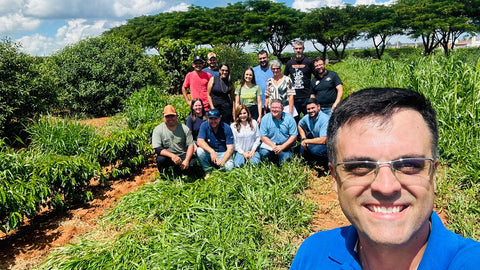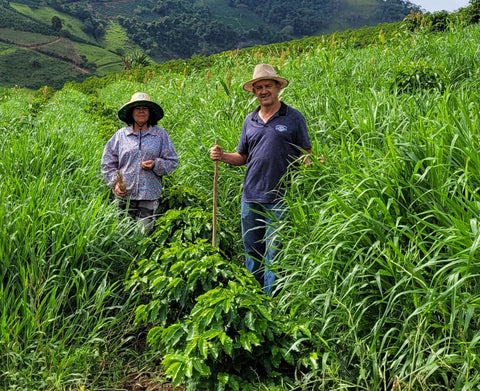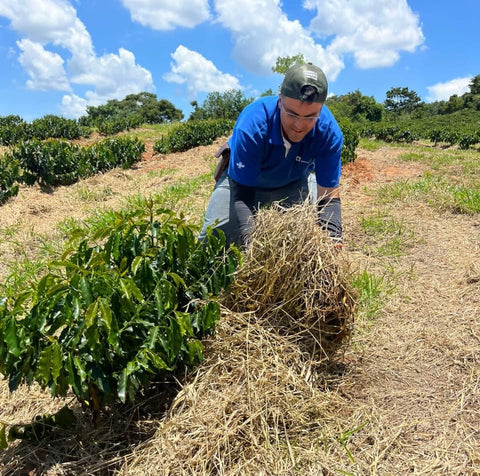Regenerative Brazil
Farmers of Coopervass, Brazil are moving towards regenerative production with amazing vigor and determination. And we are impressed!
Ever since we started working with Coopervass in 2020 we knew it was special, a-typical. Not what you would expect from a Brazilian cooperative. Alessandro, the managing director and trailblazer of Brazilian specialty coffee, was looking for his first direct export relation, and we were actively looking for direct partnership for buying specialty coffee in Minas Gerais, the biggest coffee producing region in the world. Since then, the relationship has evolved into something that the guys at Coopervass describe as family. And we agree. So as in every relationship, one of the two parties will once in a while take a leap and propose a new level of commitment. That is exactly what we did when we proposed to Thales, the export manager, to collaborate on regenerative coffee production.
During 2022, Coopervass had been in multiple conversations about sustainability in Brazilian coffee production at different coffee fairs around the world. They concluded the market was starting to ask more in that regard. So we found common ground and our partnership was a good basis to start working on regenerative production. After some first exploratory conversations to find out what motivates Coopervass and farmers to invest in sustainable production, we came to the conclusion that we needed to start where it all begins: with the soil.
Setting up regenerative practices with soil expert Ruben Borge
Wakuli has been working on regenerative production for some time in Uganda, a totally different reality compared to Brazil. In Zombo, we work together with smallholder farmers with less than 1 hectare of farm land and little to no financial means for investing in their farms. Here we work closely with Ruben Borge, a soil expert who focuses on long-term soil improvement by increasing soil organic matter, microorganisms, and mineral content, micking the natural state of healthy soil and kick-starting a self-sufficient system that is not reliant on chemical inputs.
Even though Brazil and Uganda are worlds apart, healthy soil is healthy soil, regardless of farm size or economic development of the industry. So it was a logical step for me to bring Ruben along to Brazil for some groundwork.
During the first visit, Ruben and a group of agronomists for Coopervass worked on a fact finding part: what do farmers already do, what are the challenges, and where do we see opportunities to change?

Regenerative Project - May 2023
During the second visit, Wakuli joined in, and we worked with a group of farmers on the basics of compost production, organic fertilizer, and organic pesticides.
Our program during the workshop week:
- Theory classes on soil health and compost
- Prepare small scale composting experiment
- Prepare a medium scale compost experiment
- Produce compost tea from microbes and fungi from primary forest
- Produce organic pesticide and fungicide
The biggest eyeopener was the sheer scale of everything. Where a Ugandan farmer can perfectly manage a compost heap that will provide for all of his or her farm, a Brazilian farmer might need something with the size of two tennis courts to cover his or her needs. You can imagine that starting your own composting operation is not a decision you take overnight.
We also saw that farmers were not used to working with available materials and organic matter. Most of what they use on their lands is provided through industrial and chemical companies. They can largely rely on what is written on the labels. So moving away from that and relying on their own judgment and observations is a leap of faith.
Going from 12 to 30 farmers, and counting
This might explain the small number of farmers that joined our workshops (12 out of the expected 50+) as well as the low enthusiasm we saw with the agronomists that work for Coopervass. On top of this sentiment, the coffee harvest came early in 2023. So farmers were preoccupied. The farmers who did join, however, were super keen and motivated to learn more.With this group of committed farmers, we spent 5 days working on a compost test area. We worked on liquid organic fertilizer based on available microorganisms in small areas of primary forest that are still scattered in the area.
Ever since our joint start last May, things have really taken off in São Gonçalo. Over 30 farmers have joined up to the “Green Coffee Project”. Coopervass has dedicated itself to getting all its farmers involved, in order to become 100% regenerative! With that goal, they have blown us away, and we are thrilled to work together on that sky-high ambition.

Regen Agri certification, a good thing?
Coopervass is working closely with local soil hero Jose Carlos, who Ruben and I met by chance at one of the farm visits in May. He was there on behalf of a government program, supporting small scale farmers to implement sustainable practices for soil health. His approach for crop diversification, cover crops, mulching, and organic fertilizer fit perfectly with what we set out to promote. Since then, Coopervass has contracted Jose Carlos, and together they have set their sights on getting all farmers Regen Agri certified.Hold on! Certified... Didn’t you guys at Wakuli have a strong opinion about that? We do. But still, we are enthusiastic about this one. There is no black and white. Not all direct trade benefits farmers, and certainly not all certifications are bad.
The main thing is that we do not actively ask for certified coffee, which would force farmers to invest. In this case, Regen Agri turned out to have the preference of Coopevass management, and it gives farmers the frameworks, templates, and tools needed for their voyage. It is foremost an assessment tool and can be converted into certification if farmers so desire. The biggest pro of this approach is the focus on the process, not the end result. No matter what your starting point is, every farmer can start on the road to becoming regenerative. This dedication, including KPIs and the percentage of total possible steps taken, is rewarded with a regen agri label.
The future of Wakuli's partners with regenerative agriculture
It could well be that within one or two harvest seasons, all the coffee we source from Brazil will be regenerative. We will keep you updated!

![The Wakuli Giftcard [Digital]](http://www.wakuli.com/cdn/shop/files/IMG_0014_185aaf71-12c8-4d92-ba6b-ed1b24f4ef23.png?v=1767864881)


